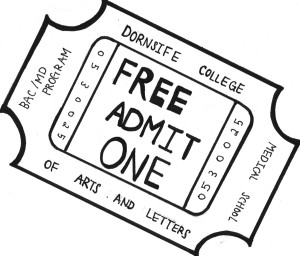Ending Baccalaureate/M.D. program harmful
Recently, the Office of the Provost, the USC Dornsife College of Letters, Arts & Sciences Dean Howard Gillman and the Keck School of Medicine Dean Carmen Puliafito decided to end the Baccalaureate/M.D. Program. Keck ended the program because it “corresponded with a loss of diversity of majors and uniqueness among its applicants.”
This reasoning evaluates students on a very limited basis. Making any assertion at all about the uniqueness of applicants reveals an arbitrary judgment by the university.
A major does not say everything about a student’s academic ambitions; many students take classes outside of their majors and participate in other activities that set them apart.
Dismissing their uniqueness discounts many students’ other accomplishments and interests.
Through an intensive selection process, the program admitted a limited number of incoming freshmen to be guaranteed admittance to Keck each fall so long as they fulfilled a number of requirements.
The security of a program like Baccalaureate/M.D. encourages students to worry less about the high-stakes game of getting into medical school so they can focus more on other areas of their undergraduate experience.
The “loss of diversity” meant that students were not showing (on paper at least) that they were exploring areas of the undergraduate experience beyond science.
The Baccalaureate/M.D. program was a talent magnet for USC. Terminating this program runs contrary to the university’s objective of improving its academic prestige.
Many students who choose to come to USC as undergraduates keep the university’s professional schools in mind. Destroying this incentive will steer many talented students away from USC, toward other schools, such as Penn State, which offers programs similar to Baccalaureate/M.D.
As USC undertakes initiatives to expand its reputation as a prestigious research university, driving away talent in science-related fields is counterproductive. Attracting more pre-med students to USC means attracting more students eager to contribute to research and other projects that will add to the university’s reputation. Twelve percent of the fall 2010 incoming class were pre-med students.
The aforementioned reasons for ending the Baccalaureate/M.D. program doesn’t seem consistent with USC’s goals of enhancing its national reputation.
The Dornsife-Keck Pre-Health Center has also stated that in terminating the Baccalaureate/M.D. program, it has “progressed to [its] ultimate goal of opening a comprehensive Dornsife-Keck Pre-Health Services Center which provides involvement opportunities and advisement for all of our pre-health students, rather than just a few selected students.”
Though such statements are comforting to those outside the Baccalaureate/M.D. program who might rightfully feel those in the Baccalaureate/M.D. program have an unfair advantage at medical school admittance, this approach might also eliminate the very reason many students have chosen to attend USC.
Eliminating a program because it provides additional opportunities for only a select group of students challenges the rationale behind any special program — honors programs, in particular.
This way of thinking could likewise target any other selective program, such as Thematic Option, the alternative honors set of General Education classes that a select few students are admitted to each year.
A private university like USC, which gives a select number of students more opportunities and advisement than the rest of college students, should embrace specialized programs like Baccalaureate/M.D. to set it apart.
The reality is that trying to justify any sort of equalizing-of-opportunity approach in a highly competitive field is practically impossible. Baccalaureate/M.D. provided some students with distinct advantages over other students, but pre-health students were all given as equal opportunity as possible to apply to the program to begin with.
Terminating the Baccalaureate/M.D. program might make some pre-health students feel more relieved, feeling some of their competition no longer gets a free ticket into medical school. But does the university want to eliminate unfair competition by destroying an incentive that draws many talented undergraduates to USC each year?
Though the Baccalaureate/M.D. program might not have fulfilled its original intentions on paper, the program nevertheless furthered some of USC’s other objectives, namely increasing academic prestige and showing that USC, a private university, has opportunities to offer students that many other universities lack.
Alan Wong is a sophomore majoring in East Asian languages and cultures.

